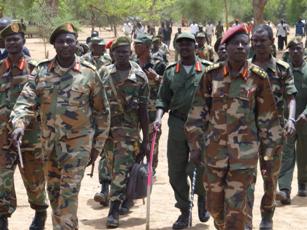SPLM-N denies losing ground to Sudanese army
February 19, 2013 (KHARTOUM) – The Sudan People Liberation Movement-North (SPLM-N) has denied announcement by Sudanese army (SAF) that it has liberated a rebel-controlled area in the restive Blue Nile state.

However, SPLM-N’s official spokesman, Arnu Ngutulu Lodi, disputed the claims, calling the statements “misleading” and “media propaganda”.
“What has been said by NCP [Sudan’s ruling National Congress Party] is completely lies”, said Lodi, maintaining Sudanese forces had not been able to enter Mafo, Maiek or Alrom areas as they had claimed.
Lodi did concede however, that heavy aerial and long range artillery bombardments by the SAF which started last Thursday had inflicted heavy casualties on the rebel group and its military equipment, as well as displacing thousands of civilians from Mafo and surrounding areas.
SPLM-N Secretary General Yassir Arman said in a previous statement that those civilians have been forced to flee closer to the Ethiopian and South Sudanese borders.
The conflict in Blue Nile started in September 2011, a few months after neighbouring South Sudan seceded under a 2005 peace deal that ended decades of civil war. A few months earlier a similar conflict broke out in South Kordofan which also lies on the borders with South Sudan.
Lodi said 86 Sudanese soldiers had been killed and many more wounded during the latest fighting, without providing details about SPLM-N losses. He also claimed his forces had destroyed a military convoy on Saturday which was heading to Ulu and fighting is continuing in the Adola area north of Haju River and 15km east of Mafo.
Today the deputy governor of Blue Nile Adam Abakr Ismail said that SAF victory in Mafo has “killed” the rebels and put them in a corner after cutting their supply routes from South Sudan’s army.
Ismail explained that the liberation of Mafo will contribute to the return of displaced civilians to their areas noting that the region is rich in minerals which he said will push the wheels of development in the state and the entire Sudan.
SIGNIFICANT LOSSES
In comments made to SUNA, Col. Sa’ad said that SPLM-N rebels had suffered significant losses, including 66 fighters, four tanks, four Land Cruiser vehicles and two tractors.
Around 70 injured rebel fighters have since moved across the border into South Sudan, including three senior officers, while other groups fled to Wadka and Aura, Col. Sa’ad added.
He acknowledged that an unspecified but “small” number of Sudanese soldiers were killed and injured.
Lodi dismissed the claims, saying the NCP was using them as a smokescreen to boost flagging morale in the party after the opposition’s “New Dawn” charter called for the toppling of the regime, as well as to “agitate and undermine” proposed peace talks in Addis Ababa on 5 March.
He further claimed the accusations were an attempt to divert attention from Khartoum’s continued refusal to allow humanitarian access to needy people in Blue Nile and South Kordofan states and reports emerging from Darfur that Islamist insurgents from Mali had arrived in the state under the protection of the Khartoum regime.
CALLS FOR PEACE
Meanwhile, in a statement extended to Sudan Tribune, France expressed its concerns about the continued fighting between Sudanese government forces and the SPLM-N in Blue Nile and Southern Kordofan states.
Paris called on both parties to negotiate an agreement on the cessation of hostilities as swiftly as possible, and to find a political solution to the ongoing crisis, as repeatedly requested by the African Union (AU) and the United Nations Security Council (UNSC).
The UNSC permanent member also urged the parties to allow humanitarian assistance to be delivered in the two regions, in accordance with a joint commitment made by the Sudanese government and the SPLM-N in August 2012 to the AU, the Arab League and the United Nations.
France also said it was concerned by the lack of progress in implementing the agreements both countries made on 27 September, as well as reports of a build-up of troops at the border. It urges the authorities of both countries to immediately implement the demilitarised zone along the border and to deploy international observers as set forth in the agreements of September 2012.
The SPLM-N fought as part of the Southern rebel army during its war with the north, but were left on the Sudanese side of the border after partition.
Khartoum accuses Juba of backing the rebels and has blocked the implementation of a number of deals they signed last year, including one on Southern oil exports, until the South severs its alleged ties with the group.
The Sudanese government has so far refused to negotiate with SPLM-N rebels, fearing that it could be forced to accept wealth and power sharing arrangements similar to the ones included in the 2005 Comprehensive Peace Agreement (CPA) signed with the South.
(ST)
